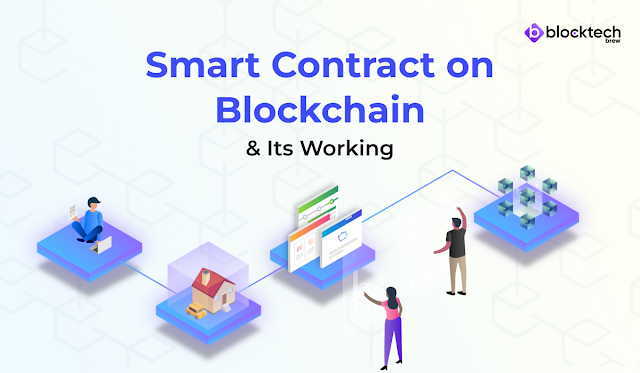What Is A Smart Contract On Blockchain And How Does It Work?
A smart contract is a self-executing seller-buyer agreement that is directly inscribed into lines of code. Traceability, transparency, & irreversibility are its hallmarks.
Automation of an agreement’s execution by smart contracts ensures
the outcome’s certainty. Further, as no third party is involved, the transaction gets completed quickly.
Here’s how the smart contract’s workflow is automated: the next action is triggered when certain conditions are met. While a traditional contract is enforceable by law, a smart contract on blockchain is enforceable by code.
When was the need for a smart contract recognized?
Nick Szabo, a legal scholar and a cryptographer, first used the term smart contract in an article in 1994. His theory was that these contracts could be written in code.
So, these can be stored and replicated on the system. Moreover, smart contracts can be supervised by a network of computers comprising the blockchain.
These could also help transfer digital assets between the parties under certain conditions.
Types of Smart Contract Based on Applications
As far as the meaning of a smart contract is concerned, there are three types:
Smart Legal Contract
It is the most common type of smart contract. When a smart contract involves legal requirements, it is legally enforceable and requires the parties to fulfill their obligations. Failure to fulfill these obligations can result in strict legal action.
Decentralized Autonomous Organization
Also called DAO, it is a community that exists on the blockchain. This community is defined by a set of agreed upon rules that are coded via smart contracts.
The rules are made up of several smart contracts and work together to watch over activities in the community.
Distributed or Decentralized Apps
DApps run on a P2P environment and are not hosted on a central server. The data is stored on a blockchain. So, the program is not controlled by a single entity.
DApps efficiently integrate the usage of a network on which a smart contract works.
Smart Contracting Devices
IoT-combined smart contracts allow for commercial transactions via IoT-enabled products. These contracts are used to govern and manage interactions between multiple devices. All this while satisfying the needs of monetization or security for the IoT.
What are the benefits of smart contracts?
Accuracy
A smart contract on blockchain is immediately executed when predetermined conditions are met. It ensures that all vital contractual terms are recorded in explicit detail.
So, there is no scope of problems arising due to a party forgetting to add certain details in an agreement.
Efficiency
The digital and autonomous nature of smart contracts substantially reduces the time spent filling out paperwork & fixing clerical errors.
Trust and Transparency
Encrypted transaction records are shared with the participants once an agreement is executed. Thus, all terms are fully visible and accessible to them.
Security
Smart contracts use the highest level of data encryption currently available on the market. The same standard is used by cryptocurrencies like Bitcoin.
Savings
Third-party intermediaries that charge high fees are cut out of the equation when smart contracts are used on blockchain.
Secure Backup
All documents stored on blockchain are duplicated several times. Thus, in the event of any data loss, originals can be restored.
No Paperwork
Businesses worldwide are becoming increasingly conscious about their environmental impact. Smart contracts facilitate the go-green movement as these exist digitally and not on paper.
Guaranteed Outcomes
This is perhaps their most potent feature. Smart contracts offer a way to substantially reduce or completely eliminate the need for litigation and courts.
This is because parties agreeing in a smart contract bind themselves to the rules of the underlying code. As such, they are not exposed to interpretations made by parties outside of the contractual relationship.
Coming Up of New businesses
Smart contracts ensure that transactions are completed in a cost effective and reliable manner. This will propel the coming up of new kinds of businesses – like P2P renewable energy trading and automated access to vehicles and storage units.




Comments
Post a Comment